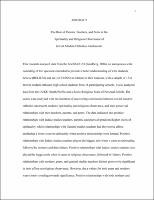Please use this identifier to cite or link to this item:
https://hdl.handle.net/20.500.12202/8682| Title: | The role of parents, teachers, and peers in the spirituality and religious observance of Jewish Modern Orthodox adolescents |
| Authors: | Goldberg, Scott Turetsky, Ilana Pelcovitz, David Betesh, Esther Leventer |
| Keywords: | Education Spirituality Religion |
| Issue Date: | Jan-2023 |
| Publisher: | Yeshiva University |
| Citation: | Betesh, E.L. (2023, January). The role of parents, teachers, and peers in the spirituality and religious observance of Jewish Modern Orthodox adolescents (Publication No. 30247443) [Doctoral dissertation, Yeshiva University]. PQDTG |
| Series/Report no.: | Azrieli Doctoral Dissertations;Publication Number: 30247443 |
| Abstract: | This research analyzed data from the JewBALE 2.0 (Goldberg, 2016), an anonymous scale consisting of 167 questions intended to provide a better understanding of what students believe (BELIEFS) and do (ACTIONS) in relation to their Judaism, with a sample of 1341 Jewish modern orthodox high school students from 18 participating schools. It also analyzed data from the DUKE Health Profile and a Socio-Religious Scale of Personal Beliefs. The scales were analyzed with the intention of uncovering correlations between Jewish modern orthodox adolescent students’ spirituality and religious observance, and their perceived relationships with their teachers, parents, and peers. The data indicated that positive relationships with Judaic studies teachers, parents, and peers all predicted higher levels of spirituality, while relationships with General studies teachers had the reverse effect, predicting a lower score in spirituality when positive relationships were formed. Positive relationships with Judaic studies teachers played the biggest role when it came to spirituality, followed by mothers and then fathers. Positive relationships with Judaic studies teachers also played the biggest when it came to religious observance, followed by fathers. Positive relationships with mothers, peers, and general studies teachers did not prove to be significant in their effect on religious observance. However, the p values for both peers and mothers were closely trending towards significance. Positive relationships with both mothers and fathers correlated with positive relationships with Judiac studies teachers, general studies teachers, and peers. Students with more religiously observant parents were more likely to have positive relationships with Judaic studies teachers than those with less religiously observant parents. This study is important for better understanding how different relationships affect spirituality and religious observance. |
| Description: | Dissertation, EdD / Open Access (embargo 6 mos.) |
| URI: | https://hdl.handle.net/20.500.12202/8682 https://ezproxy.yu.edu/login?url=https://www.proquest.com/dissertations-theses/role-parents-teachers-peers-spirituality/docview/2774591435/se-2?accountid=15178 |
| ISBN: | 9798368458229 |
| Appears in Collections: | Azrieli Graduate School of Jewish Education & Administration: Doctoral Dissertations |
Files in This Item:
| File | Description | Size | Format | |
|---|---|---|---|---|
| Esther Leventer Betesh OA 6 mos embargo Jan2023.pdf | 826.66 kB | Adobe PDF |  View/Open |
This item is licensed under a Creative Commons License

